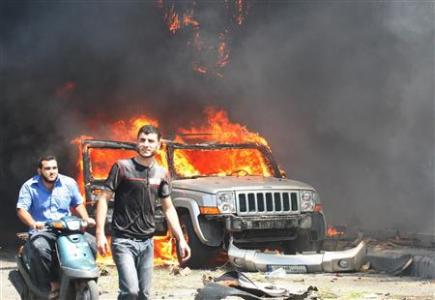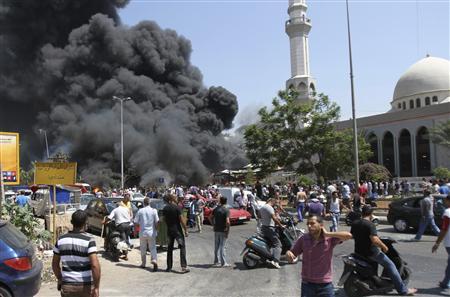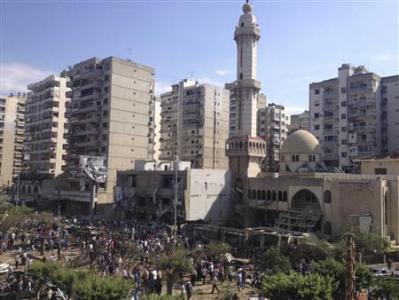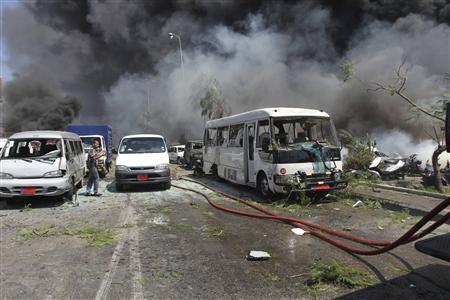www.aljazeerah.info
News, August 2013
Archives
Mission & Name
Conflict Terminology
Editorials
Gaza Holocaust
Gulf War
Isdood
Islam
News
News Photos
Opinion Editorials
US Foreign Policy (Dr. El-Najjar's Articles)
www.aljazeerah.info
|
Editorial Note: The following news reports are summaries from original sources. They may also include corrections of Arabic names and political terminology. Comments are in parentheses. |
45 Lebanese Killed, Hundreds Injured in Blasts Targeting Mosques in Tripoli
August 23, 2013
 |
 |
 |
 |
Deadly blasts strike northern Lebanese city of Tripoli
At least 45 people were killed and hundreds wounded after two explosions hit Lebanon’s northern city of Tripoli on Friday, FRANCE 24 reports. Both of the blasts struck outside of mosques as Friday prayers came to an end.
Deadly blasts strike northern Lebanese city of Tripoli
By Kethevane GORJESTANI (video) FRANCE 24 (text)
AFP, August 23, 2013
Two powerful explosions just minutes apart killed at least 45 people in Lebanon's main northern city of Tripoli on Friday, hospital sources told FRANCE 24. Some 358 others were wounded, the health minister said.
The first blast rocked the city centre near the home of outgoing Prime Minister Najib Mikati, although his office said he was not in Tripoli at the time.
The second struck near the city’s port, close to the home of former police chief Ashraf Rifi, a security source said.
Map of Lebanon
Footage aired on local TV showed thick, black smoke rising over the city and bodies scattered beside burning cars in scenes reminiscent of Lebanon’s 1975-90 civil war.
The blasts hit amid rising tension in Lebanon as a result of Syria’s civil war, which has sharply polarised the country along sectarian lines and between supporters and opponents of the regime of Syrian President Bashar al-Assad.
Tripoli, a predominantly Sunni Muslim city, has seen frequent clashes between Sunnis and Alawites, a Shiite offshoot sect to which Assad belongs. But Tripoli itself has rarely seen such explosions in recent years.
Attacks have become increasingly common in the past few months against Shiite strongholds in Lebanon, particularly following Hezbollah’s open participation in Syria’s civil war.
On August 15, a car bomb rocked a Shiite stronghold of Hezbollah in the southern suburbs of Beirut, killing 27 people and wounding over 300. Another car bomb targeted the same area on July 9, wounding over 50.
Friday’s explosion marks the first time in recent years that such explosions have targeted Sunni strongholds and is bound to raise the country’s sectarian tensions to new levels.
There was no immediate claim of responsibility for the attacks, which raised the scepter of Iraqi-style tit-for-tat explosions pitting Sunnis against Shiites.
(FRANCE 24 with wires)
Bombs kill 42 outside mosques in Lebanon's Tripoli
By Oliver Holmes and Nazih Siddiq
Fri Aug 23, 2013 4:22pm EDT
TRIPOLI, Lebanon (Reuters) -
Bombs hit two mosques in the northern Lebanese city of Tripoli on Friday, killing at least 42 people and wounding hundreds, intensifying sectarian strife that has spilled over from the civil war in neighboring Syria.
The apparently coordinated blasts - the biggest and deadliest in Tripoli since the end of Lebanon's own civil war - struck as locals were finishing Friday prayers in the largely Sunni Muslim city. Lebanese officials appealed for calm.
The explosions in Tripoli, 70 km (40 miles) from the capital Beirut, came a week after a huge car bomb killed at least 24 people in a part of Beirut controlled by the Shi'ite Muslim militant movement Hezbollah.
A recent resurgence of sectarian violence in Lebanon has been stoked by the conflagration in Syria, where President Bashar al-Assad is fighting a largely Sunni-led rebellion. Both Hezbollah and radical Sunni groups in Lebanon have sent fighters over the border to support opposing sides in Syria.
Medical and security sources said the death toll from Friday's blasts in Tripoli had risen to 42 by late afternoon. Hundreds more were wounded, they said.
The first explosion hit the Taqwa mosque, frequented by hardline Sunni Islamists, and killed at least 14 people there, according to accounts earlier in the day.
Further deaths were reported from a second blast a few minutes later outside the al-Salam mosque, which the Interior Ministry said was hit by a car laden with 100 kg (220 pounds) of explosives.
A Reuters reporter at the scene said the blast left a huge crater and the floors of the mosque were covered in blood. A 50-metre (160-foot) stretch of the road was charred black and the twisted remains of cars littered the area.
"We were just bowing down to pray for the second time and the bomb went off. The air cleared, and I looked around me and saw bodies," said Samir Jadool, 39.
Lebanon's Red Cross said more than 500 people were wounded in the two explosions. Television footage showed people running through the streets, some of them carrying bloodied victims.
Near the Taqwa mosque blast site, angry men toting AK-47 assault rifles took to the streets and fired in the air while other men threw rocks at Lebanese soldiers nearby.
"Back off," said one militant, when journalists approached the scene. Soldiers peeked out at the mosque from a nearby base but did not approach it.
U.N. Secretary-General Ban Ki-moon condemned the bombings and called on all Lebanese people to "exercise restraint, to remain united, and to support their state institutions, particularly the security forces".
"BEGINNING OF THE STORM"
Witnesses at the scene of the blasts said anger was rising among locals, who were shouting out accusations that Assad's government or Hezbollah were behind the attack.
"This is the work of a criminal," seethed Jadool, who held a bloodied bandage against his head, the result of flying debris from the blast at the al-Salam mosque.
Video obtained by local news channel LBC showed the moment of the explosion at al-Salam mosque. The blast ripped through a wall of the mosque, showering clouds of dust on people sitting on prayer mats and sending dozens running out of the building.
Lebanese officials called for calm as tensions rose in Tripoli, a Mediterranean port that has seen some of the worst Syria spillover violence. Sunni gunmen have sporadically clashed with fighters from the city's minority Alawite sect, an offshoot of Shi'ite Islam to which the Assad family belongs.
Former internal security chief Ashraf Rifi, whose home was damaged by the second blast, warned Lebanon was facing a growing threat. "We are still in the beginning of the storm and we must remain aware and try to protect this nation," he said, speaking outside his home. "This storm has become a huge, grave danger."
Officials in Tripoli called on the government in a joint statement to step up security in the city. Mohammed Kabara, a member of parliament who read out the statement, accused the Syrian government of carrying out the Beirut and Tripoli bombings to create strife in Lebanon.
Prominent Salafist sheik, Dai al-Islam Shahhal, also blamed the Syrian government for the Tripoli bombs and said it was "pure terrorism".
Hezbollah released a statement condemning the Tripoli blasts and expressing solidarity with the victims, saying they were targets of efforts to fan more violence in Lebanon.
"We consider this the completion of an effort to plunge Lebanon into chaos and destruction," the statement said.
Hezbollah's political opponents called on the group to withdraw its forces from Syria in response to Friday's attack.
Lebanese Defence Minister Fayez Ghosn warned against being dragged into deeper sectarian bloodshed. "We are calling for calm and vigilance, because the aim of this (the bombings) is to stoke strife between sects," he told LBC.
Salem al-Rafei, chief cleric of the Taqwa mosque, is a staunch supporter of Syrian Sunni rebels as well as Lebanese Sunni militants who have joined the anti-Assad battle in Syria.
(Additional reporting by Michelle Nichols at the United Nations; Writing by Erika Solomon and Mariam Karouny; Editing by Pravin Char)
Fair Use Notice
This site contains copyrighted material the
use of which has not always been specifically authorized by the copyright
owner. We are making such material available in our efforts to advance
understanding of environmental, political, human rights, economic,
democracy, scientific, and social justice issues, etc. We believe this
constitutes a 'fair use' of any such copyrighted material as provided for
in section 107 of the US Copyright Law. In accordance with Title 17 U.S.C.
Section 107, the material on this site is
distributed without profit to those
who have expressed a prior interest in receiving the included information
for research and educational purposes. For more information go to: http://www.law.cornell.edu/uscode/17/107.shtml.
If you wish to use copyrighted material from this site for purposes of
your own that go beyond 'fair use', you must obtain permission from the
copyright owner.
|
|
|
|
||
|
||||||


